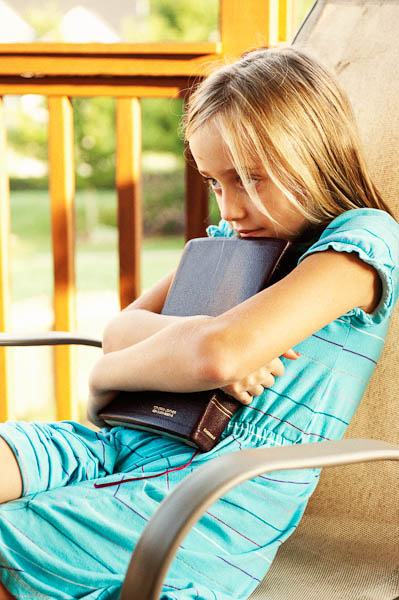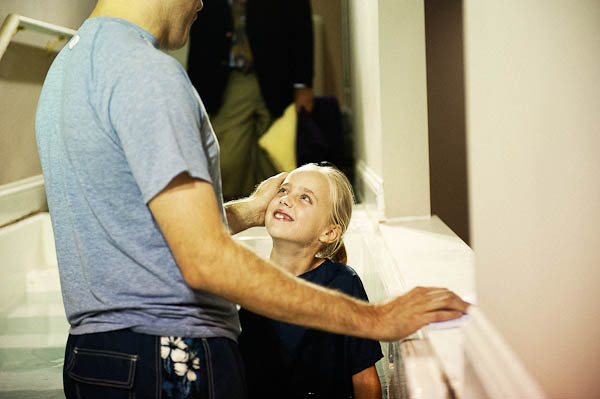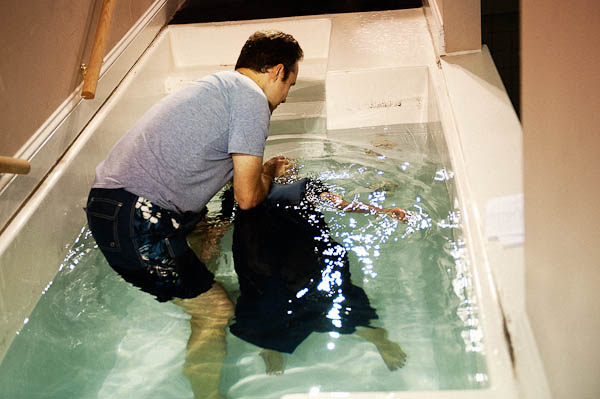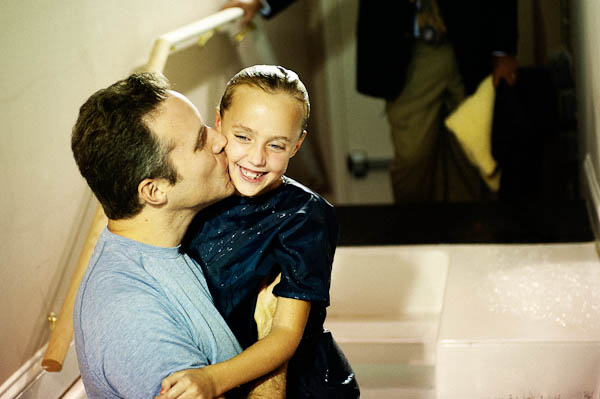new
My baby girl is all brand new, a butterfly free from a soul’s cocooning.
She felt it, and we did too. The acknowledgement of it glistened in her eyes as she looked at her dad, and then at me, water dripping from wet fingers.
On Sunday morning, we’d been discussing Nehemiah chapter 8 over breakfast—why the Israelites, returned from exile, wept when Ezra read the book of the law; why Nehemiah and the others had instructed them not to grieve, “for the joy of the LORD is your strength (Nehemiah 8:10).” Kevin pointed out to Zoe that the Israelites had plenty of reason to mourn. They knew that their disobedience, their lack of delight in this law, had led to years of exile, death for some, the destruction of Jerusalem. “They had to have been thinking about all the things they’d done wrong,” he said.
“But here they were back in Jerusalem at last,” I added. “It wasn’t a day to cry about the past but to celebrate that God had forgiven them, loved them enough to bring them back and let them begin again. It was time for a feast, time to have joy over what God had done.”
Zoe nodded, taking all this in. “I think,” she said, speaking carefully, pausing only briefly, “I think I should be baptized.”
“O-kay,” I said slowly, realizing that Zoe had just made a connection she needed, one I still need, the crack in the sheltering cocoon. My daughter is an old-soul, has always been. At four, she saw part of The Lion, the Witch, and the Wardrobe and explained the symbolism to me, her baby lips curving as she spoke. “See Mom, that lion,” she jabbed a pudgy finger at the TV, “he’s just like Jesus. And that witch,” she said, turning back to me with an expression of distaste, “she’s like the devil.”
The cross, Christ’s sacrificial death, resurrection, sin, these things Zoe tucked deep inside the moment she understood them, looking away. Baptism was not something we discussed in long conversations, mostly because Zoe resisted, seeing in the details both her own worm-i-ness and the public admission of this reality. She did not want to tell everyone that she screws up all the time, even though she’d rather not, and that it makes her weep. Every time Zoe and I have any sort of serious teaching moment regarding something like selfishness or deceit, she gets so upset about her mistake that she aches over the reality of the human condition. Many times, she’s said to me through tears, “I just try so hard, and still I mess up and I don’t mean to. I don’t want to.” The confession, echoing Paul’s words in Romans, “I do not understand what I do. For what I want to do I do not do, but what I hate I do (7:15),” always makes me hurt, and I reach for her, and I tell her how beautiful she is, how special a soul. Then I tell her that no one is perfect, and only One ever was, and that only He can make us more than we are. I tell her how much He loves her, even when she makes the wrong choice; how He died because He knew she would make mistakes; how Love has covered over a multitude of sins. I whisper to her that He’d have done it all to save only her, though the reality is that His blood covers an uncountable number.
But baptism is not something I believe in pushing on someone else, least of all my children. In fact, all the arguments about it only make me sad. Somehow all the dithering about the where and the when and the how and the if seem to degrade the beauty of the action. I think we’ve missed the gift and the get to somewhere along the way, the Ethiopian eunuch, who never could’ve set foot in any temple, pointing at the water with such emotion and asking Philip, “Look, here is water. What can stand in the way of my being baptized (Acts 8:37)?” He did not have to be coerced or bludgeoned with judgment.
As is usually the case in our house, Riley asked the questions about baptism. And every time Riley and I spoke about the washing in her hearing, Zoe would look at me with pleading eyes and say, “Mom, I really don’t want to talk about this.” So I did not push, knowing the decision must be one born of a truly transformed heart, seeing in her still the dark shadows of the cocoon.
Hardly any of us really want to confess sin. We close the gates against the thoughts and judgments of those no less guilty than we, forgetting for a time that shiny personas only disguise the truth. I have tried to be honest with my children about this reality, the truth that I still struggle with sin, that I make mistakes every day. I have asked God to rip off the locks, so that I can even be transparent with you. It isn’t easy, vulnerability.
Over the centuries, hymns have been altered over this stronghold. We’re like butterflies still staring at the remains of the cocoon, unable to walk away. The lyrics of John Newton’s passionate Amazing Grace were once re-written so that instead of
Amazing grace! How sweet the sound/That saved a wretch like me
parishioners could offer
Amazing grace! How sweet the sound/That saved and strengthened me…
…Or “saved a soul like me,” or “that saved and set me free.” Wikipedia attributes the changes, I think accurately, to the desire to “downplay a sense of imposed self-loathing by its singers.” When Isaac Watts wrote his of awe in the hymn At the Cross, he called himself “such a worm,” but some later so disdained assenting to a similar self-evaluation that they changed the lyrics to “such a one as I” instead. And the reason we dislike the idea of such true confession, indeed, the reason we often can’t even confess it to ourselves, is the same reason Zoe did not even wish to hear the rest of us discussing baptism. It’s the iron bars that keep some from ever acknowledging Christ at all. As Kevin would say at this point, “we put the emphasis on the wrong syllable.”
So many of us spend our lives doing that, living in defeat, our eyes focused on our failures. We’re like Lazarus, fresh from the grave, still wrapped in “strips of linen, and a cloth around his face.” It’s the whole reason Jesus made a point to say, “Take off the grave clothes (John 11: 44),” even though now that Lazarus lived no one would’ve let him walk around like that. Nehemiah 8 cleared all that up for Zoe in one quick, Holy Spirit whoosh. She could see, sitting there imagining Ezra and Nehemiah and all those men on the platform before the people gathered in that ancient square, the Levites among them explaining the law as it was read, hour after hour after hour. She understood, as she witnessed all that weeping and tearing of clothes, the rips slicing through the silence, interrupting the flow of the public reading. She got it, at last, when she heard Nehemiah say, halting Ezra’s reading mid-sentence, “Stop. No more weeping. No more weeping! This is a time for joy and celebration. The joy of the Lord is your strength.” Then she knew: it has never really been about us at all.
The wrong, yes, that’s all ours. It should make us weep, truly sorry. It should make us ache for wanting to be different. That is, after all, repentence. That is the recognition of self’s betrayal, the giving over to death. It has always been the reason for exile. But the forgiveness, the return, the rising, that has never been about us at all. Zoe finally saw, in those last moments before she finally broke free with her wings all wet and turned her back on self, that baptism wasn’t really about her sin. It is the repetitious echo of the heart of history. He died, he was raised, I live because of what He did.
And when she knew that it was really about celebrating what He had already done for her, about the fact that He loved her that much—enough to bring her home from exile and let her begin again—she could not wait to get in the water. Even her nerves about the people watching disappeared. I saw the determination flashing in her cornflower blue eyes. That slim, tall-for-her-age girl with a soul too big for her little body stood in my bathroom while I was getting ready and said, “I don’t want to wait. I want to do it this morning.” I put down my brush. The Ethiopian eunuch. The ones who, understanding what He had done for them, said, “Brothers, what shall we do (Acts 2:37)?” I imagined them standing there, her “great cloud of witnesses (Hebrews 12:1).”
I hugged her. “Okay,” I said, feeling myself shake. It was one of those moments, the ones where you catch your breath, knowing that you’ll never forget. I went downstairs and found Kevin, knowing that he would want to prepare. To see this, our own children echo the everything that matters, it is our “you now dismiss your servant in peace” thing, to borrow Simeon’s phrase (Luke 2:29). I knew she wanted Kevin’s hands to be the ones that laid her dead to sin, dead to self in the water, his hands the ones that raised her a new creation, alive in Christ (Colossians 3: 1-4; Romans 6: 1-12; 2 Corinthians 5:17). I have always loved that my man has never been afraid to feel, and I knew this would make him feel so much it overflowed.
When our brother, our friend, our preacher took her public confession, my vision blurred. Kevin and Zoe wept—first the father, then the daughter. It was not, you understand, a confession of her sin. It was the confession of faith in who He is, the baptism her confession of what He has done.
“Do you believe that Jesus Christ is the son of God?”
How many times, over so many years, has that question been asked? I cried when I heard that Rachel Scott, murdered in the Columbine High School tragedy in 1999, died after she answered that question in the affirmative. In the time of Nero, confessing faith in Christ meant torturous execution. But the truth is that the simple answer “yes” to that one question always records a death—the death of Christ for sin, our dying with Him.
The question asked, Kevin crumbled, tears rolling down his cheeks. Zoe, seeing his emotion, followed suit. “I’m happy, I’m happy,” he whispered to her through his tears, not wanting her to be sad on his account at a time that called for joy. “I know,” she said solidly, still crying with him.
It’s no accident that the symbolism—the dying, the entombment, the raising to newness–has eternally reverberated across history and cultures and the natural world. This is the story of the butterfly, the Phoenix, the Aztec’s Quetzalcoatl, the Egyptian Osiris, the Greek Adonis, the Japanese Izanagi, and a whole list of others. It permeates myth extensively precisely because it is not a myth at all. It has been the everything that matters since the creation of the world. God makes no apologies for repeating Himself. It was Joseph who told Pharaoh that,
The reason the dream was given to Pharaoh in two forms is that the matter has been firmly decided by God, and God will do it soon (Genesis 41:32).
Want to know what matters to God? Look for Him to get all repetitious about it and say it in several different ways, one a shade of another. And this, this is everything…the everything of life, the everything of scripture, the everything for eternity. Why should we not expect that its echoes would reach those who don’t believe, that God would choose to see it written not only over and over on the pages of scripture but in the myths of ancient cultures and into the very fabric of the natural world? Paul wrote,
For since the creation of the world God’s invisible qualities—his eternal power and divine nature—have been clearly seen, being understood from what has been made, so that people are without excuse (Romans 1:20)
It is the reason that baptism itself is an activity practiced since ancient times by various groups. Truly, it does fulfill the law and the prophets, this truth: God made a way to bring His exiled children home. Death, resurrection, new life.
We left the room to prepare. In our place of worship, there are special garments worn for baptism. People we love came to help us, get towels, make sure everything was ready. Our good friend Paul came up to take all these beautiful photographs. Zoe traded her dress for a navy blue jumpsuit—shorts and top all one piece. I told Zoe about the day I was baptized and how you never forget, the stamp it is on your memory, the seal on your soul. She giggled nervously about the fact that another kid hit the water the same day I did, before me. “Everyone can hear everything you say in there,” I warned her, “and he said something crazy about it being like Jaws—it’s a movie, about a shark—and everyone in the auditorium started laughing. I thought I was going to die of embarrassment.”
She grinned. “I think I’m glad it’s just me today.”
Once she had dressed, she could not wait any longer. She walked up the steps that led to the baptistry, which in our building is fortunately heated. It’s like a large bathtub with steps leading up to it from both sides. Kevin had not yet appeared on the other side, and so she waited anxiously, her hand on the stair rail against the wall. I stood beside her, trembling.
This was it. Her time. Her chance to join the repetition of the saints, the echo of God’s voice through time, culture, peoples of every language and tribe, nature itself. This beautiful action, God’s gift, allowing us to participate yet again in the reflection of what He’s done, would be the foreshadowing of her crown cast at His feet.
“She’s ready,” I heard our preacher say, and I thought, “Oh yes. She’s ready.”
Kevin walked down the steps into the water and reached out for our Zoe, our girl. He had written something to say to her. It reminded me a bit of the way that God just could not keep silent when Jesus himself urged a reluctant John to baptize Him too, the most powerful ripple of all in this repetitive current, “to fulfill all righteousness (Matthew 3:15).” There it is again, that word. Fulfill. Scripture says of Christ’s baptism that,
At that moment heaven was opened, and he saw the Spirit of God descending like a dove and lighting on him. And a voice from heaven said, “This is my Son, whom I love; with him I am well pleased (Matthew 3: 16,17).”
Kevin said something similar, but since Kevin’s voice never made men fall down and gasp for breath, God allowed him a few more words. He put his arm around our Zoe, and looking into her eyes, he said,
Zoe Elizabeth Henegar, before you were born your mother and I chose your name very carefully. It was our desire for your life to be one devoted to Christ. As you are aware, your first name, Zoe, means “life,” and it is often used to refer to “spiritual life.” You were named Elizabeth after my dear aunt, who lived and breathed God’s word, even to the point of being days away from death, her body ravaged by cancer, quoting the words of Job, “The Lord giveth and the Lord taketh away. Blessed be the name of the Lord.”
My dear, sweet daughter, from early on, you have always been full of life and love. The child-like trust and faith you have demonstrated as well as the spiritual insights you possess have been an inspiration for both your mother and me, in addition to many others. I am so proud of you. Today and every day. Today I’m proud that you came to this decision on your own, because of your love for Jesus. And I’m proud that you had the courage to do this this morning, in the presence of your whole church family, even though you were nervous. Zoe, I love you and I pray for many years for you to serve and love in the kingdom of God. And it is with great honor that I now have the privilege to baptize you in the name of the Father, the Son, and the Holy Spirit, for the remission of your sins and for the gift of the Holy Spirit, who will live in you.
That’s when the tears poured for me, watching Him tell her before family that she is ours, that we love her so much, that in her we are well pleased. Then Kevin put one hand behind her head and one over her mouth and nose, and swept her under the water until none of her was visible except the bubble of the jumpsuit she wore.  In that moment, our baby girl declared in her flesh what God has said and shown and demonstrated in an infinite number of ways for all time. He died. My son died. He took all your sin, all your wrongness, all the bad choices you will ever make in this life and He wore them to the cross. He made the way for you to come home.
In that moment, our baby girl declared in her flesh what God has said and shown and demonstrated in an infinite number of ways for all time. He died. My son died. He took all your sin, all your wrongness, all the bad choices you will ever make in this life and He wore them to the cross. He made the way for you to come home.
All she said, the message felt instead of heard in that moment, swept under the water, in the briefest silence, was, He died for me. I don’t want to live for myself anymore.
One of my good friends related to me that during her own baptism as an adult, in that tiny, frozen moment, she thought, “Now I’m dead.”
When Kevin lifted our baby girl, I heard the rush of divided water falling aside, the sound of air escaping from a sealed tomb and a stone rolled away. Once again, in the body of another Redeemed Child, God said, But I raised Him from the dead. Death cannot hold my son. And because of Him, it will not hold you away from me.
It was so much for a little girl with an old soul to say, her body all wet, surrounded by witnesses living and those already in glory. For I died, and my life is now hidden with Christ in God (Colossians 3:3).
She looked at me and beamed, the water dripping from her hair. She looked so new, so resolved, so filled with irrepressible joy. What a gift.
I am stunned that God lets us participate in repeating His heart, that He let my baby girl join her voice with His as she surrendered her life into His hands. “Oh my,” I thought, hugging her tight in a towel. “Who are we that He should allow us to be part of something so significant?”











